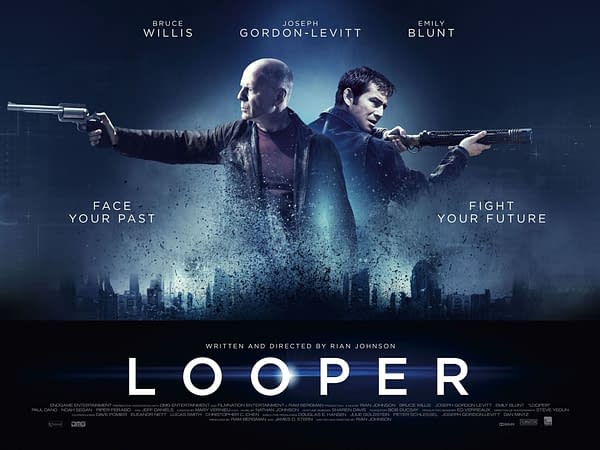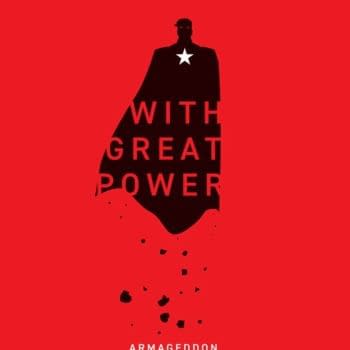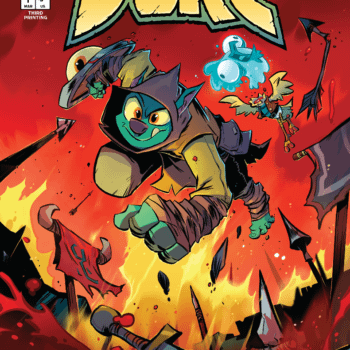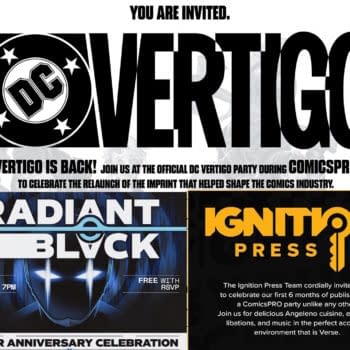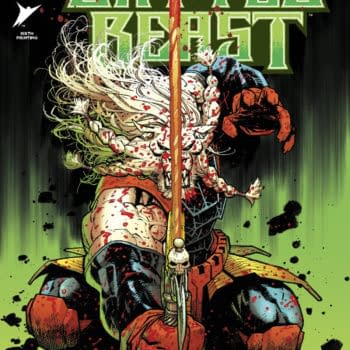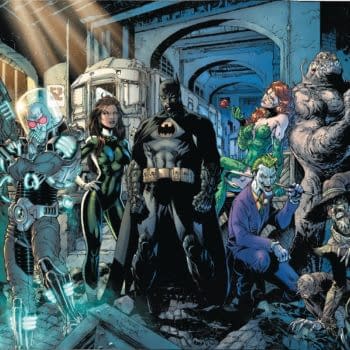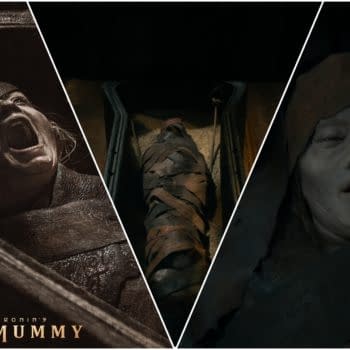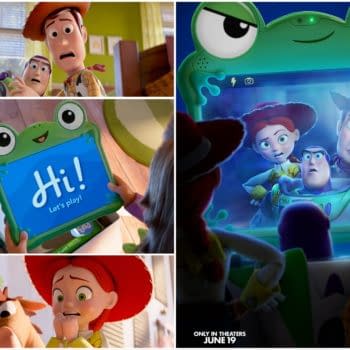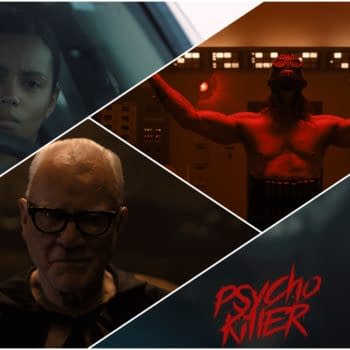Posted in: Movies | Tagged: china, looper, time travel
Looper Showed China Its Future to Get Time Travel Past Censors
Chris Fenton, former president of the China-based DMG Entertainment Motion Picture Group, has written a book, Feeding The Dragon, looking at his career, getting American movies into Chinese markets, notably Looper and Iron Man 3. I recently read it, can confirm it is quite the page-turner, and that there are so many nuggets to share. You can follow along with a few of the stories I'm sharing with this link. Now, obviously this is Chris Fenton's take on what happened and already I am getting pushback from some other folk. But I definitely think it's a version worth representing. We looked at how plot and casting changes to Iron Man 3 were suggested and implemented to appeal to the Chinese government, but much of this was preceded with changes made to Looper from the original script – specifically how they got round issues with the portrayal of time travel on screen, something forbidden by Chinese authorities.
"The original script had no China relevancy whatsoever in the film. Absolutely none. No Chinese characters, no Chinese locations, no Chinese references, no Chinese anything. Other than the United States, the only other country mentioned and used in the original script was France. With great persistence, we eventually convinced the filmmakers to change every one of Looper's plot points involving France to China— the actors, the locations, the references, everything. Every mention of something French transformed into something Chinese. And in the process, we also brought China into the financing, development, production, marketing, and distribution of the film. It was no easy task to get the filmmakers to agree to any of this, but we got it done.
Money talks, and when filmmakers see a way to increase the budget to get more shooting days and increased production resources, they'll listen. Even better is when you can showcase how China can enhance the story. They just needed to believe the money was real and that the changes in the script would make the film better. Convincing everyone took some time and effort, but we eventually made the entire Looper village believers."
"Making money in one of the largest film markets was the initial and most prioritized goal. That was all anyone cared about. No one in Looper's village really gave a shit about China. And for sure, deep down, China couldn't really give a shit about us. Diplomatic altruism was simply a beneficial shrapnel of capitalism."
Fenston refers to a Hollywood Reporter article in 2011 written by Jonathan Landreth, a journalist that Fenton worked a lot with in helping with DMG's promotion.
By working with DMG, which boasts close working ties with the state-run China Film Group, Endgame plans to shoot part of Looper in China, a move that, along with casting Xu, could help the movie skirt Beijing's annual 20-title cap on imported films allowed to share in their own box office gross.
Fenton talks about how "strengthening Looper's relevance in the market through the strategic implementation of Chinese elements allowed the film to circumvent that limit, positioning the film for a substantial piece of the then-$1.5 billion box-office pie—a sum that had increased 64 percent from the previous year in a market that would hit $10 billion annually
by 2019." He also highlights Landreth's article
To lend Looper a futuristic feel – and project one possible outcome of the real-life currency valuation debate ongoing between Washington and Beijing — DMG's design department is mocking up a futuristic Chinese note that will used as money throughout the movie, DMG's director of international business said. Asked whose likeness would feature on the new notes, L.A.-based Daniel Postaer said: "Mao, of course. There are some things you just don't change."
Denton talks about the importance of having the movie designated a US-China co-production
"a status never given to a major Hollywood film before. Such a designation granted lots of benefits, particularly the ability to release the film in concert with the US release, to market and promote the film early, and to garner a 43 percent share of the film's box-office gross rather than the standard 13 to 17 percent at the time."
As a result, Looper was under the eye of the industry and a variety of governments. But the process was also used when trying to get Marvel to go down a similar route with Iron Man 3. This is how Chris Fenton says he and DMG's Dan Mintz discussed it with Marvel executives, including executive producer Charles Newirth and creative executive Stephen Broussard.
"We have the wind to our backs with Looper in the market. We've been marketing and promoting it since day one. We had a launch event. We have constant press attention. We've
had Joseph Gordon-Levitt over there for the launch and the shooting. The coverage of him being there was amazing. We took over his Weibo account as a result too. We are constantly building his followers and those of the film. We are doing exactly what satisfies the government mandate of incorporating China into every facet of the filmmaking and
film promotion process."
And, picking up on the role of the design department, how they got round issues regarding time travel. This Chinese concern is believed to revolve around the idea that China's Revolution could be undone, a concept that the government doesn't want to even suggest. Fenton writes
"Think about the plot for a second. A majority of the plot takes place in the future," I began. "Last January, Hollywood Reporter described the vital role of our design team, but they didn't elaborate much. Well, let me tell you, they were on the front lines. Their hard work massaged the government, and it wasn't by verbal lobbying. Instead, they used creativity and relevancy to lobby. They showcased a future China powerfully in the film. It was music to the ears of the Politburo and a delight to the Communist Party municipal officials in Shanghai. Our team illustrated how beautiful and sophisticated Shanghai can and will be. China was powerful and the center of the world in Looper. Yes, it had the balance of thugs and drugs and other negative attributes, but the film tilted the weight of the world towards China, and our team designed the majesty of that in the city's futuristic skyline. We made Shanghai the most modern, technology-advanced city in the world."
"Do they even know what they want Shanghai to look like that far in the future?" Charles asked. "Well, if any country does, it's China. They are the home to the twenty-five, fifty, and hundred-year plans!" I responded. "But, in reality, no. Not really. But they are okay looking at potential examples of designs and ideas and choosing from those. And that's what we did. We showed city officials potential building shapes and skyline outlines. Then we guided them to the ones we thought worked best for the film. We presented impressive high-resolution graphics that blew the government away. Our modeling team even brought those designs to life with scaled models that officials could touch and feel. Pre-visuals and storyboards depicted exactly what the scene would look like, including our actors among the models."
We showed the designs on my computer. An image of Joseph Gordon-Levitt was superimposed in each slide. I left copies of the images behind so they could use them to impress Kevin and other senior colleagues. I also gave them actual stills from the on-location production of Looper. The stills next to the design images illustrated what the finished version would look like. They were impressed. Asking them to pass along the materials internally made total sense. Pictures speak a thousand words.
Problems continue with the SEC investigation into DMG, Chinese film production and allegations of bribery, and the cut of Looper also had issues.
"We have a lot of footage from the China portion of Looper's production," I said to my Beijing-based colleague Billy Neo one evening. "I know they don't intend to put it in the film though. The cut is too long as it is."
"We need more in there. If the Chinese expected footage in the movie that is now cut by the American side, we're in a lot of trouble." "I know. I know. It doesn't look good." I was sitting in my guest house at the time. My kids, boy and girl twins named Dylan and Kaylie, were five years old by then. I'd typically join them for dinner and help Jennifer with their bedtime routine. After the kids were asleep, I'd head out to my guest house office and make calls to China. "The fact is, we are all simply trying to make the best movie possible. There's no anti-China motivation or anything. That's what is crazy!" I exclaimed.
"Doesn't matter. China Film Group is already pissed about the SEC investigation. They will see this as Americans cutting out crucial China footage. Think of all the time the Shanghai government put into creating their skyline with us. Now a lot of it isn't even in the film! It's a loss-of-face thing."
"I get it, but I can't tell Rian Johnson to put more footage in the movie just because China wants it in there. If it doesn't make the film better, then we shouldn't be imposing crap like that. We'll be out of business fast. We're not in the China infomercial game!" I was frustrated.
"What if we make two cuts of the movie? One will be the cut Rian wants, the other takes the footage we want and puts it in the film for China's audience?" I suggested. "We could make the China cut a good five to ten minutes longer that way. We could get all the great skyline shots of Shanghai in there and more. Lots of Xu Qing's footage too, since some of it didn't make this latest cut!"
"Can you do that?" Billy asked.
"I don't see why not. What would Rian care? He gets his cut for the world. We get our cut for China."
"The government may force us to do that anyway."
"I know. So, let us be the one that suggests it first. Puts us on offense."
And that's what they did, but there were still issues with China, when the double-cut cot leaked to the press. Fenton writes;
Think about it from the Chinese perspective. Here's a film that they bent over backwards for in terms of providing amazing access and support during shooting. Our production team then got the absolute best footage of one of their most prized cities. Additionally, the Chinese worked tirelessly with our filmmaking team to construct a city skyline that was both realistic and impressive, symbolic of the city's prowess far into the future. Then there's the great actress Xu Qing. When Hollywood cast her in this major production, it was a source of great pride for the Chinese. For them to hear that both Shanghai and Xu Qing were possibly being cut from the global film was insulting. However, when you add to that the notion that the filmmaking team didn't believe the film's China relevancy was interesting or important enough in the story to make the final cut, it's downright embarrassing. "China, your contributions to the film are only for your local audience to see. The rest of the world is simply not interested,"
So Fenton had another call to make.
"Chen, you've got to help me, please!" I begged Chris Chen, Executive Vice President at Endgame, one of our partners on Looper. "CFG & SARFT are putting major pressure on DMG to have a 'Chinese Element' pictured on the artwork along with the 'big Hollywood stars.' We need our Chinese actress there next to Bruce [Willis] and JGL [Joseph Gordon-Levitt]. We are scrambling to make this happen. Please help!"
"Seriously? We're crushed on time. What are they saying? If we don't, then what?"
"I'm not in those government meetings. I'm not sure what alternatives, if any, the government is giving us. All I can say is that my colleagues in Beijing are receiving massive pressure to make it look like China has a real presence in the film—globally."
"It does, though!"
"It doesn't globally. You guys have a cut with very little China going to the worldwide market. It's a loss of face, and they are asking us to address it somehow."
"China is a central part of the plot. It didn't even exist in the film before you guys came along."
"It's not what's in there. It's what they know is not in there, and when the press outed the two-cut strategy, they just assumed lots of China got cut. Obviously, this pressure is coming from officials higher up than even SARFT. The negative political climate towards the US and Hollywood movies right now is beyond bad," I explained. "FYI, Hollywood films made sixty million of the sixty-one-million-dollar total at the box office last week in China. That's not good if you're trying to build a local business! The local film industry is up in arms. The timing couldn't be worse!"
"I'll do what I can. You know I will."
"I appreciate it, Chen. Thank you," I said, hanging up.
And Chen did come through. Our Chinese actress, Xu Qing, made it onto the global poster, and it was just what we needed to get CFG and SARFT to finally sign off on a release date! Finally, some good news!
But looking into it, however, the only such posters I can find were Chinese-only.
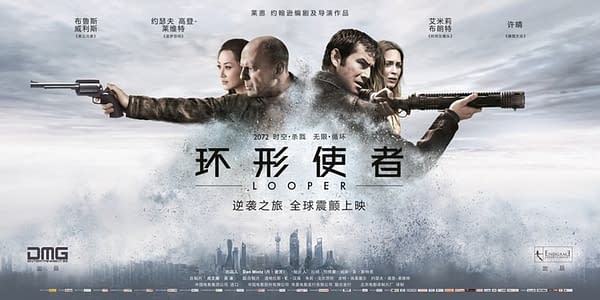
All the international posters I can find only feature Bruce Willis and Joseph Lovett.
